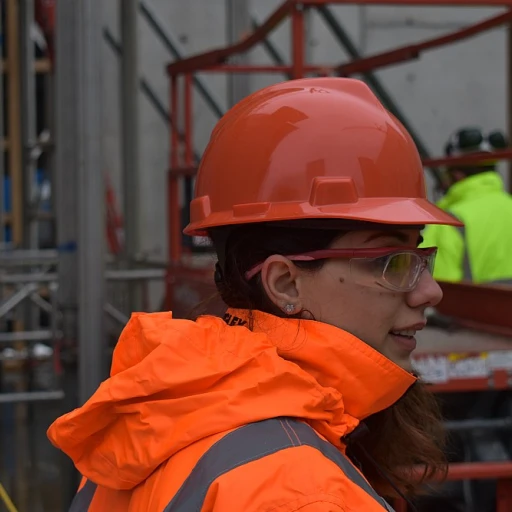Understanding the Skills Gap in Renewable Energy
Unveiling the Skills Deficit
The renewable energy sector is in a transformative phase as it pivots towards sustainable solutions. Yet, this shift reveals a gap between the skills needed and those available in the workforce. This disparity is particularly apparent in the areas of solar power and energy storage, where technological advances outpace the existing capabilities of professionals in the field. Swinerton Incorporated, a notable name in engineering procurement and construction, exemplifies the challenge as it pushes for expansion in solar projects across the United States. Swinerton, through its SRE and SOLV Energy branches, is tackling large-scale solar construction projects. However, they, like many other companies in this industry, face a shortage of skilled workers. The demand for knowledgeable project managers, construction managers, and technicians in sectors such as procurement construction and energy storage is pressing. According to industry news, the U.S. Department of Energy highlights the need for expanded training programs to fulfill the requirements of jobs in renewable energy, particularly in states like California where the market is robust. American Securities, a private equity firm associated with Swinerton Renewable, underscores the urgency to develop a qualified workforce. Their investments depend heavily on the availability of skilled professionals to maintain the momentum of current and future projects. As Swinerton Solutions seeks effective ways to bridge this skills gap, the focus on workforce development, including the cultivation of expertise in renewable energy, becomes ever more critical. San Diego and San Francisco emerge as key locations for implementing innovative training strategies. By focusing on construction epc services, these regions are setting benchmarks for refining skills that are vital in the deployment and maintenance of solar power facilities. Addressing the skills gap is not just about filling immediate job vacancies; it encompasses contributing to the long-term growth of the renewable energy sector. Dedicating resources to skill development provides a sustainable career path for workers and ensures an uninterrupted transition from traditional energy to renewables. For those interested in exploring ways to address these challenges, delving into essential leadership training topics can provide significant insights.Swinerton's Approach to Workforce Development
Workforce Development Through Strategic Partnerships
Swinerton’s approach to bridging the skills gap in the renewable energy sector involves a multifaceted strategy, targeting the crux of workforce development. In the heart of San Francisco to the sunny fields of San Diego, the company is at the forefront of solar power project execution and development, driving change through innovative strategies.
Leveraging the expertise of Swinerton Builders and the agile services of SOLV Energy, Swinerton incorporates a holistic engineering procurement construction model to address skill gaps in renewable energy. By collaborating closely with diverse partners, the company ensures that its projects are executed with the highest standards of quality, tapping into pools of talent across the United States.
Important to note, Swinerton places emphasis on nurturing new talent by involving project managers and their teams in comprehensive training sessions that enhance their expertise in energy storage and the construction EPC framework. Guided by American Securities, a prominent private equity firm, Swinerton adapts to evolving industry standards, ensuring an agile response to the dynamic market needs.
Furthermore, managing California's vast array of renewable projects requires Swinerton to maintain a workforce that is not only highly skilled but also adaptive to technological advancements. The company employs innovative strategies to upskill its team, supporting the broader goals of sustainable construction and renewable energy growth.
As the demand for skilled labor continues to rise, Swinerton Renewable and Swinerton Energy respond proactively, focusing on developing a skilled labor force that meets both current and future renewable energy needs. In the ever-evolving landscape of renewable energy, Swinerton, in collaboration with local educational institutions and industry stakeholders, plays a significant role in mitigating the skills shortage through its thoughtful approach.
Key Skills Required in the Renewable Energy Industry
Essential Skills for the Renewable Energy Workforce
As the renewable energy sector continues to grow, there's a clear demand for a skilled workforce to support projects ranging from solar power installations to energy storage systems. Swinerton, a prominent player in the field, emphasizes the importance of specialized skills to successfully navigate the complexities of the industry.
The key skills required in renewable energy align with the industry's diverse needs, which include engineering, procurement, and construction expertise. These skills are crucial for the design, management, and execution of solar projects across the United States, from California's bustling hubs like San Diego and San Francisco to other regions contributing to the green energy revolution.
Roles such as project managers and construction professionals are vital in coordinating efforts between teams and ensuring projects meet technical and regulatory requirements. Their responsibilities involve overseeing the installation of solar panels, managing energy storage systems, and ensuring renewable energy solutions are safely integrated into the power grid.
Companies like Swinerton Builders and Swinerton Renewable Energy, a part of the Swinerton Incorporated family, are actively addressing the workforce needs by focusing on the development of these critical skill sets. With projects backed by private equity firms such as American Securities, there is a significant emphasis on providing engineering procurement construction (EPC) services that are sustainable and efficient.
It's also worth mentioning that technology is playing a transformative role in skill development. Online platforms offer innovative solutions for bridging skill gaps in various sectors, providing accessible education and training opportunities. Online courses are paving the way for workforce development in renewable energy, ensuring a steady pipeline of qualified professionals ready to meet the challenges of this exhilarating field.
The Role of Technology in Bridging the Skills Gap
Harnessing Innovation to Address Workforce Challenges
The renewable energy sector faces an undeniable skills gap as it attempts to meet the world's growing demand for sustainable power solutions. Leveraging technology, particularly through innovative engineering procurement and construction (EPC) strategies, stands as a critical component in closing this gap. With firms like Swinerton Renewable Energy (SRE) pushing the envelope in job creation and project execution, we are witnessing a transformation in how construction and energy sectors tackle workforce development. Technology's role in bridging the skills gap should not be underestimated. Through advanced software and systems, such as those deployed by Swinerton Incorporated, companies can streamline their processes, making it easier for the existing workforce to adapt and thrive. For instance, Swinerton's projects in California showcase the significant impact of tech integration, helping project managers and construction teams stay ahead. Moreover, with the involvement of private equity firms like American Securities, the renewable sector receives the necessary capital to invest in cutting-edge solar technology and energy storage solutions. These investments not only enhance existing capabilities but also drive the need for a more technically skilled workforce. This aligns particularly well with the developments in places like San Francisco and San Diego, hotbeds for solar power projects, where innovation meets the bottom-line objectives of lowering costs and increasing efficiency. Admittedly, adopting new technologies brings challenges. Key among these is ensuring that renewable energy services have personnel skilled in the latest software and technological tools. Training programs that focus on relevant hardware, software, and innovative project design become essential. More so, firms must remain up-to-date with their privacy policy and security protocols to protect data related to technology use. Swinerton Builders, through its subsidiary, Solv Energy, ensures that the shift towards tech-driven solutions is accompanied by comprehensive skills training. By fostering collaboration among various engineering, procurement, and construction stakeholders, tech integration initiatives can significantly reduce the energy sector's skills gap, ultimately delivering a more robust and knowledgeable workforce for the United States.Challenges in Implementing Skills Development Programs
Overcoming Obstacles in Workforce Training Programs
The renewable energy sector, particularly in regions like California, faces unique challenges when implementing skills development programs. Swinerton, a well-established company involved in solar power and construction projects, is at the forefront of workforce development within the industry. However, despite their experience and dedication, several hurdles remain. Firstly, there is the challenge of aligning educational programs with the rapid technological advancements in solar power and energy storage. The industry's swift evolution requires continuous updating of curriculum and training tools to ensure they meet current and future needs. Swinerton and other companies must stay agile to incorporate the latest techniques in engineering procurement and construction EPC seamlessly into their training regimens. Additionally, regulatory complexities can impose hurdles. Various regions in the United States, and globally, demand different compliance and privacy policies, complicating the deployment of standardized training programs. This is especially true for multinational enterprises where Swinerton Renewable and Americans Securities engage in international projects. Navigating these diverse regulations requires robust project management and clear communication between all levels of the workforce. Another challenge is ensuring accessibility and inclusion in training programs. Opportunities in renewable energy should be available to a wide demographic, requiring investment not just in technical education but also in digital literacy and equitable job opportunities. Swinerton Builders, alongside their solv services, can work on making training sessions more accessible to underrepresented groups, fostering a more diverse and inclusive workforce. There is also the obstacle of securing adequate funding for skills development. With renewable energy projects often demanding significant initial investment, securing private equity or other financing for large-scale training initiatives can be complicated. Partnering with equity firms or accessing federal support could provide the necessary resources to create a robust training infrastructure. In conclusion, while Swinerton Incorporated and partners like SRE Solv and Solv Energy are dedicated to closing the skills gap, crossing these hurdles requires a concerted effort from management teams, project managers, and the wider renewable energy community. By addressing these challenges head-on, the industry can make significant strides in cultivating a skilled workforce capable of meeting the demands of future projects in San Diego and beyond.Future Trends in Renewable Energy Workforce Training
The Future Landscape of Renewable Energy Workforce Training
As we look toward the future of renewable energy, the landscape of workforce training is set to undergo significant transformations. New advancements and emerging trends are redefining how the sector approaches skill development, particularly in construction EPC (Engineering, Procurement, and Construction) and solar power projects.- Integration of Technology and Innovative Learning Platforms: The renewable energy industry, including stalwarts like Swinerton, is likely to embrace digital training solutions. The use of virtual reality (VR) and augmented reality (AR) for on-site training in solar installations and energy storage is expected to grow. These technologies allow for realistic, immersive experiences without the costs or risks associated with live environments.
- Emphasis on Digital Skills: With the rise of digital transformation in the construction industry, there's an increasing need for project managers and the workforce to be adept with digital tools and data analytics. Swinerton Incorporated and similar entities need to prioritize digital literacy to stay competitive and efficient.
- Customized Training Programs: Programs tailored to specific roles and responsibilities within the industry will become more prevalent. For instance, companies such as Swinerton Builders and SOLV Energy, backed by equity firms like American Securities, are expected to develop targeted training approaches, addressing the unique demands of renewable energy projects across the United States.
- Collaborative Partnerships: Collaboration with educational institutions and private equity firms can contribute to a robust talent pipeline. Partnerships can focus on creating dynamic curriculum enhancements that incorporate real-world project insights from companies like Swinerton Renewable and SRE SOLV.












